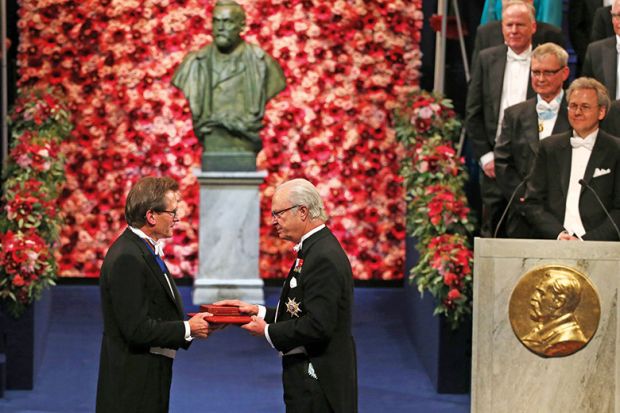Ask a Nobel laureate to assess the challenges facing universities, the risks to scientific progress and anything else that they may lie awake at night worrying about, and you’ll get an answer worth listening to.
Ask 50 of them, in the biggest survey of its kind, and you get a truly unique perspective on everything from Donald Trump and research assessment to declining public support for universities and threats to the future of mankind.
This week, we publish the findings of an exclusive poll carried out by Times Higher Education in association with the Lindau Nobel Laureate Meetings organisation, coinciding with the THE World Academic Summit, which is taking place at King’s College London from 3 to 5 September.
Given the collective heft of these scientific heavyweights (the survey covers laureates in science, medicine and economics), we decided to seek views on topics in higher education and on a few broader issues facing the world.
What’s striking is that there is some consensus on both fronts. For universities, perhaps inevitably, many of the biggest challenges boil down to money.
But there are nuances in the laureates’ responses. Several, for example, identify the growing inequality between public universities and “wealthy, tax-exempt private institutions”, as one puts it, as the most pressing concern in US higher education.
At last year’s THE World Academic Summit at the University of California, Berkeley, Robert Reich, who served as labor secretary in the Clinton administration, noted that the private elite institutions, with their staggering endowments, can now receive more public funding in the form of tax breaks than the public universities do in direct subsidies.
And the wealth inequality identified in the laureates’ survey is not only about funding, since “at top private universities, the number of students with parents in the top 1 per cent of income is equal to the number of students with parents in the bottom 50 per cent of income”, one respondent says.
Another links this to the wider issue of universities’ faltering connection with the societies in which they operate, warning that they “need to bridge all of humanity” if they are to fulfil their missions and prosper.
If academic leaders think that turning universities into “businesses” will solve their funding woes, they are “wrong-headed”, one respondent cautions. “We need better [public] support for universities, which probably requires [greater] understanding of the value of education.”
One interesting trend in the survey responses is that while the laureates are united in identifying declining public investment as a major threat to the egalitarian mission of universities, they seem less concerned about changes in the way that research is funded.
Speaking at the Berkeley summit, Saul Perlmutter, the Nobel prizewinning physicist, said that he doubted that his research, which took years to yield results, would have been funded at a time when a premium is placed on quick, translatable results. We asked the laureates in our survey whether they thought that they could have made their own discovery in today’s funding environment. Perhaps surprisingly, the majority think that they could.
That’s not to say that they disagree that the funding environment is difficult – most acknowledge that it is. But many also say that funding has always been hard to come by, while some point out that their work received little or no funding and suggest that it is down to individuals to overcome such problems.
“I have faith that even in the most mission-oriented research [era], a place can be found for fundamental research. And the best people know how to turn applied research into fundamental knowledge,” one says.
As for the issues that these scientific superstars believe pose the gravest threats to mankind, the answers range from Trump and technological advances, to demographic change and environmental catastrophe.
The question is whether science can do much to directly thwart these threats, and in many cases the view seems to be that it can – but only with political will and the prioritisation of education on a global scale.
As one laureate concerned about global population growth, which is set to increase from 7.5 billion today to 11.2 billion by the end of the century, puts it: “The population explosion, leading to the destruction of the environment, pollution and migration [is our most pressing challenge]. It is politics which has to act. Science can provide facts.”
On another recurring theme, technological change (with Facebook among the threats identified), several echo the laureate who suggests that “losing our humanist perspective as we rush into the age of the internet and its seductions” constitutes the gravest danger.
However, not all the Nobel prizewinners fear that the end is nigh. “I don’t think that mankind will succeed in its efforts to become extinct,” one writes.
The biggest threat of all, then?
“Complacency.”
Register to continue
Why register?
- Registration is free and only takes a moment
- Once registered, you can read 3 articles a month
- Sign up for our newsletter
Subscribe
Or subscribe for unlimited access to:
- Unlimited access to news, views, insights & reviews
- Digital editions
- Digital access to THE’s university and college rankings analysis
Already registered or a current subscriber?





